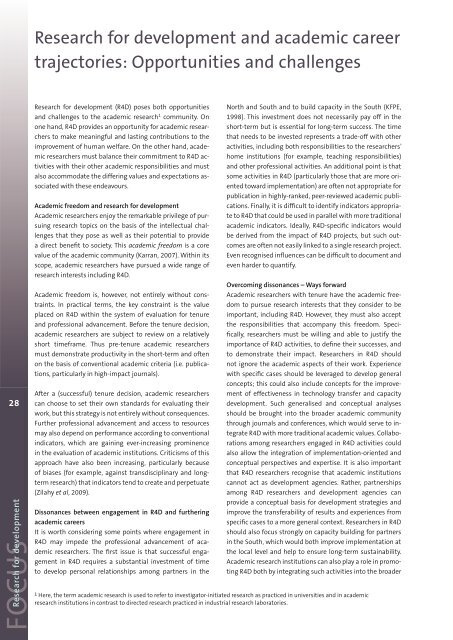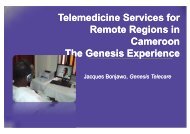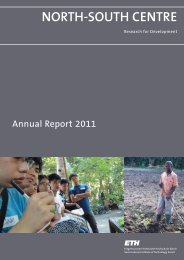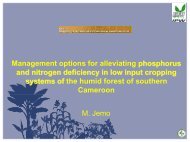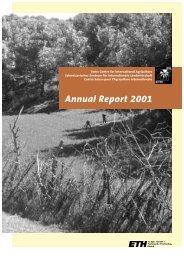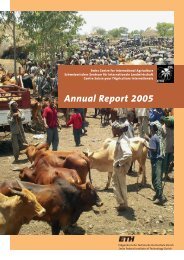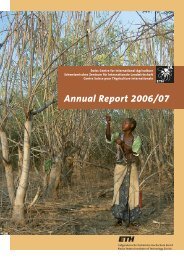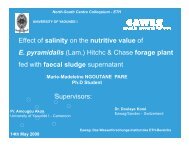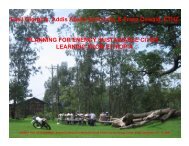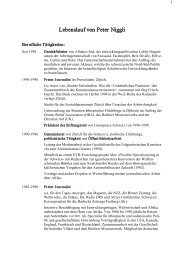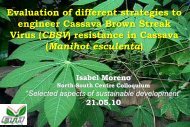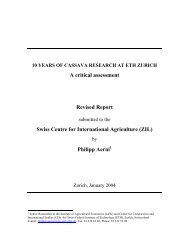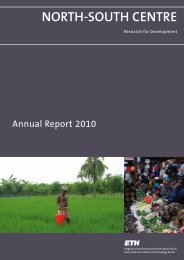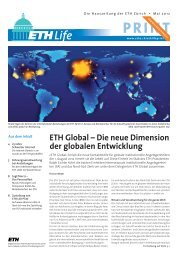NORTH-SOUTH CENTRE - ETH - North-South Centre North-South ...
NORTH-SOUTH CENTRE - ETH - North-South Centre North-South ...
NORTH-SOUTH CENTRE - ETH - North-South Centre North-South ...
Create successful ePaper yourself
Turn your PDF publications into a flip-book with our unique Google optimized e-Paper software.
Research for development and academic career<br />
trajectories: Opportunities and challenges<br />
Research for development (R4D) poses both opportunities<br />
and challenges to the academic research 1 community. On<br />
one hand, R4D provides an opportunity for academic researchers<br />
to make meaningful and lasting contributions to the<br />
improvement of human welfare. On the other hand, academic<br />
researchers must balance their commitment to R4D activities<br />
with their other academic responsibilities and must<br />
also accommodate the differing values and expectations associated<br />
with these endeavours.<br />
Academic freedom and research for development<br />
Academic researchers enjoy the remarkable privilege of pursuing<br />
research topics on the basis of the intellectual challenges<br />
that they pose as well as their potential to provide<br />
a direct benefit to society. This academic freedom is a core<br />
value of the academic community (Karran, 2007). Within its<br />
scope, academic researchers have pursued a wide range of<br />
research interests including R4D.<br />
Academic freedom is, however, not entirely without constraints.<br />
In practical terms, the key constraint is the value<br />
placed on R4D within the system of evaluation for tenure<br />
and professional advancement. Before the tenure decision,<br />
academic researchers are subject to review on a relatively<br />
short timeframe. Thus pre-tenure academic researchers<br />
must demonstrate productivity in the short-term and often<br />
on the basis of conventional academic criteria (i.e. publications,<br />
particularly in high-impact journals).<br />
After a (successful) tenure decision, academic researchers<br />
28 can choose to set their own standards for evaluating their development. Legende Such generalised and conceptual analyses<br />
work, but this strategy is not entirely without consequences.<br />
Further professional advancement and access to resources<br />
may also depend on performance according to conventional<br />
indicators, which are gaining ever-increasing prominence<br />
in the evaluation of academic institutions. Criticisms of this<br />
approach have also been increasing, particularly because<br />
of biases (for example, against transdisciplinary and longterm<br />
research) that indicators tend to create and perpetuate<br />
(Zilahy et al, 2009).<br />
FOCUS<br />
Research for development<br />
Dissonances between engagement in R4D and furthering<br />
academic careers<br />
It is worth considering some points where engagement in<br />
R4D may impede the professional advancement of academic<br />
researchers. The first issue is that successful engagement<br />
in R4D requires a substantial investment of time<br />
to develop personal relationships among partners in the<br />
<strong>North</strong> and <strong>South</strong> and to build capacity in the <strong>South</strong> (KFPE,<br />
1998). This investment does not necessarily pay off in the<br />
short-term but is essential for long-term success. The time<br />
that needs to be invested represents a trade-off with other<br />
activities, including both responsibilities to the researchers’<br />
home institutions (for example, teaching responsibilities)<br />
and other professional activities. An additional point is that<br />
some activities in R4D (particularly those that are more oriented<br />
toward implementation) are often not appropriate for<br />
publication in highly-ranked, peer-reviewed academic publications.<br />
Finally, it is difficult to identify indicators appropriate<br />
to R4D that could be used in parallel with more traditional<br />
academic indicators. Ideally, R4D-specific indicators would<br />
be derived from the impact of R4D projects, but such outcomes<br />
are often not easily linked to a single research project.<br />
Even recognised influences can be difficult to document and<br />
even harder to quantify.<br />
Overcoming dissonances – Ways forward<br />
Academic researchers with tenure have the academic freedom<br />
to pursue research interests that they consider to be<br />
important, including R4D. However, they must also accept<br />
the responsibilities that accompany this freedom. Specifically,<br />
researchers must be willing and able to justify the<br />
importance of R4D activities, to define their successes, and<br />
to demonstrate their impact. Researchers in R4D should<br />
not ignore the academic aspects of their work. Experience<br />
with specific cases should be leveraged to develop general<br />
concepts; this could also include concepts for the improvement<br />
of effectiveness in technology transfer and capacity<br />
should be brought into the broader academic community<br />
through journals and conferences, which would serve to integrate<br />
R4D with more traditional academic values. Collaborations<br />
among researchers engaged in R4D activities could<br />
also allow the integration of implementation-oriented and<br />
conceptual perspectives and expertise. It is also important<br />
that R4D researchers recognise that academic institutions<br />
cannot act as development agencies. Rather, partnerships<br />
among R4D researchers and development agencies can<br />
provide a conceptual basis for development strategies and<br />
improve the transferability of results and experiences from<br />
specific cases to a more general context. Researchers in R4D<br />
should also focus strongly on capacity building for partners<br />
in the <strong>South</strong>, which would both improve implementation at<br />
the local level and help to ensure long-term sustainability.<br />
Academic research institutions can also play a role in promoting<br />
R4D both by integrating such activities into the broader<br />
1 Here, the term academic research is used to refer to investigator-initiated research as practiced in universities and in academic<br />
research institutions in contrast to directed research practiced in industrial research laboratories.


